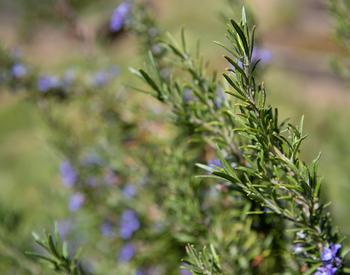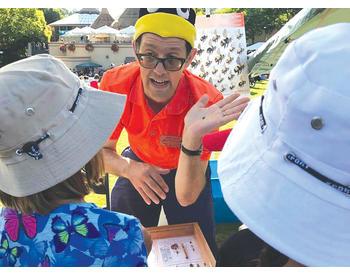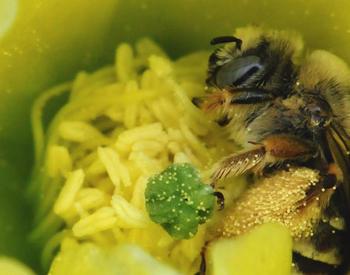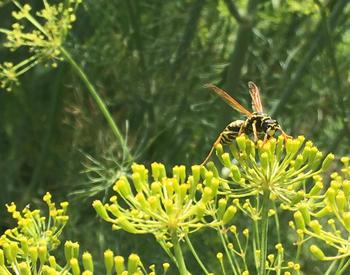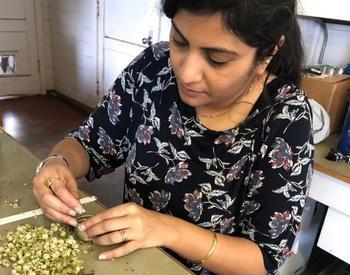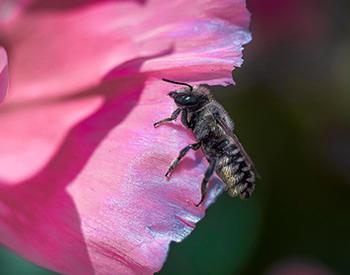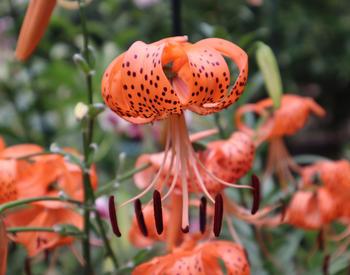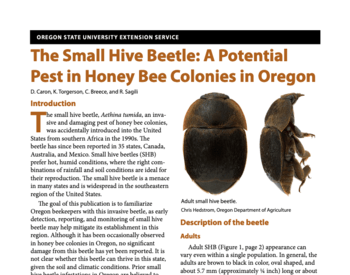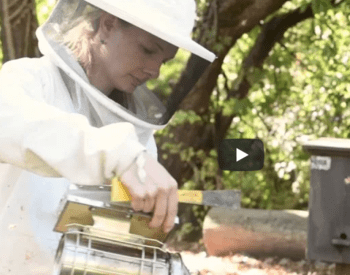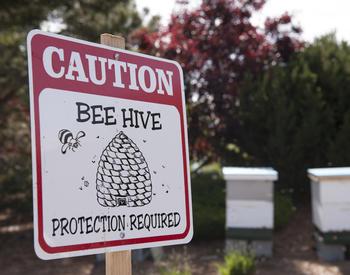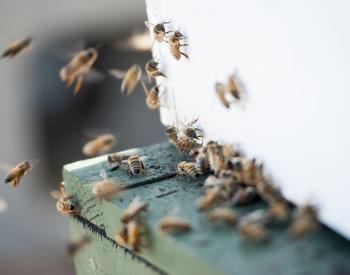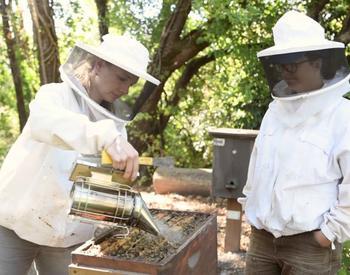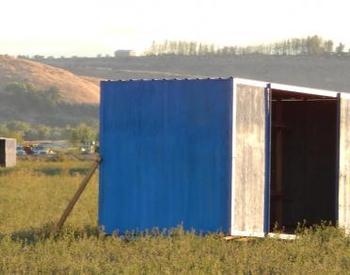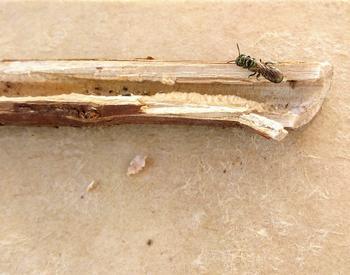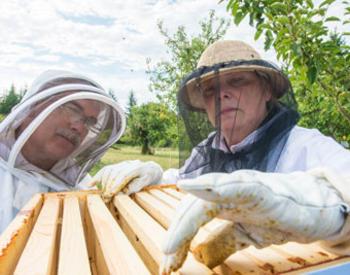Transcript
Speaker 1: From the Oregon State University Extension Service, this is Pollination, a podcast that tells the stories of researchers, land managers, and concerned citizens making bold strides to improve the health of pollinators. I'm your host, Dr. Adoni Melopoulos, assistant professor in pollinator health in the Department of Horticulture. I have a soft spot in my heart for amateur naturalists.
Ever since I read Gerald Durell's My Family and Other Animals as a Child, I have had tremendous regard for those people who go out and study natural history for the love of it. And that includes our guest this week, Travis Owen, the amateur anthocologist. Now for full disclosure, I also didn't know what an anthropologist was before I met Travis.
Anthropologist is a fancy word for a pollination ecologist, somebody who studies the role of pollinators in their environmental context. The context that Travis works in is pretty remarkable. He's in Southern Oregon, which has some of the highest levels of B-Biodiversity in the state, but he's an amateur because his day job is working with bees, but in another way. He works for a commercial beekeeper who's an established queen breeder in Southern Oregon, and he essentially fits in his anthology in between his work hours. This episode's full of some amazing observations from daffodils to carpenter bees, so sit back and enjoy this walk through the eyes of the amateur anthropologist, Travis Owen. All right, listeners, I am in the cab of a truck in the Southern Oregon Extension Center at OSU with Travis Owen, the amateur anthocologist. Welcome to pollination. Thank you. And the cab of my truck.
Speaker 2: Thank you. Both are very nice. I have been looking at your website for a long time. It's really curious because you have some wonderful observations of bees and parasitic wasps in this area in Southern Oregon. How on earth did you pick that up? Wow. It's more than a hobby.
Speaker 3: Oh, yeah. It started as a hobby. It started as gardening and what I can plant for my bees. And then it evolved to other bees and other plants and native plants. And then finally wasps and how many wasps fill multiple roles, including pollinators, pest control agents, and just really cool. They're like aliens.
Speaker 1: And you really get a sense of it. There's so much diversity. When you go through your website, you've got your really good photographer too. But let me pick this up again. Yes. You started as a beekeeper.
Speaker 3: I started as a very amateur gardener. Oh, okay. And my garden was terrible because I wasn't good at it. So I thought, hey, I was actually walking into the store one day and I saw a beekeeping display that they had never had before.
And I said to myself that I'm going to try that. Screw it. Let me get bees.
So I did. I got some local bees. I got one nuke and grew it into one hive. And before I got it, actually, I started looking at plants for bees.
What can I do for the bees? And then once I got them, I just started learning more and more. It kind of snowballed and escalated and weighed down the rabbit hole. There's no way back now.
Speaker 1: So there's lots of beekeepers. We were just at the Southern Oregon Beekeeper Association meeting and there are lots of beekeepers in there. But not a lot of people I know who are beekeepers take this other route. And it must have been when you saw bees, you really kind of their biology and natural history morphology must have captured you.
Speaker 3: Absolutely. And their diversity. A lot of people aren't... I mean, honeybees are kind of the poster child, right? But a lot of people aren't aware of the multitudes of species just in any one region, let alone, I think there are around three to four thousand in the country. And they are all so different. So vastly different. And they're so different than honeybees. Honeybees are kind of the outsiders actually.
And one of the only ones that make honey. Explain. Yeah, explain how they're an outsider. Most the majority of the bees don't live in a hive. They don't even live with other bees. They live alone and they make their own nest either in the ground or twigs or wood and beetle holes or some dig their holes. Total diversity.
Some excrete wax-like secretions or some make the kind of resinous secretions and some use dirt or leaves as in the mason bees or leafcutter bees, which are also used for pollination commercially.
Speaker 1: Okay. So we got this diversity and you're in an area where there's... It's a pretty... I mean, all of Oregon's pretty distinct. This is a pretty distinct habitat. You've been roaming around kind of looking at things and it seems like oftentimes you're beekeeping and then you're sort of like you snap a few pictures of something on the side.
Speaker 3: That's the great thing about beekeeping. I mean, I do it for work. So I get to work outside and sometimes our apiaries are in really beautiful natural areas. Sometimes less so. But there's always a mix of nature out there, whether it's native or not, native plants, sometimes there's weeds, but there's always an interesting mix. Pollinators are so diverse and adaptable. They're able to adapt to native and non-native species. I mean, it goes both ways and that's another thing that's really fascinating and captured my imagination. Honeybees too, they're not even native to this country and they're able to work a lot of the flowers part of their adaptability makes them such great pollinators for our food.
Speaker 1: You know, that was one thing I had to say that was surprising to me. Because I come from... Hey, we both come from beekeeping backgrounds. And I thought with native bees, there'd be this extreme specialization. Like you'd have these like... And it's not that common. There are a lot of bees with broad diets.
Speaker 3: Yeah. Yeah. There are a few that only work maybe one family of plants and very, very few that work one species of plants. But the majority seems to work a variety and it will even work your plants in your garden, which makes conservation easy. I mean, you can plant natives or non-natives and still help your native pollinators as well as your honeybees.
Speaker 1: So tell us a little bit about the environment down here in Southern Oregon. What are some of the... What's the kind of cycle with some of the bees? Walk us through a season in Southern Oregon and some of the patterns you see.
Speaker 3: Okay. Well, most of our rain is in winter and spring and then it pretty much dries up by July. Definitely dry. It's when our dearth hits for honeybees. So they don't really grow after that unless we feed them. For our native bees, a lot of the most diverse diversity of species are active in spring and then the early summer. There are some that are active till fall, but a lot less. Most are active in the spring when there's the most wildflowers and bloom.
So for say a digger bee, the amphiphora is one genus, they live in the ground. So in say the spring or summer, depending on the species, actually some are throughout the year, an adult will emerge. She will visit flowers for food and herself and also to gather provisions for a nest. She will dig her own nest or maybe multiply if she has enough eggs and life in her. Then the eggs will be laid with a ball of pollen.
Each one will be partitioned into its little chamber. So they will hatch. If it's early in the year, say summer or spring, they will hatch and feed on the food. And then when fall comes around, they will go into a state of hibernation basically, and over winter is pre-pupa or something and then emerge in the spring again. So the majority of their life there in the cell, in fact.
Speaker 1: I guess it's like they're mostly in the ground. We're only seeing the tip of the iceberg when they pop out and they have their life above ground.
Speaker 3: Exactly. So here in southern Oregon, we've got rain during the fall, winter and so we have this flush of bees in the spring. What are some of the plants and what are some of the kind of unique kinds of plant communities that our bees are taking advantage of down here? Well, there's quite a few actually. As you said, it's a very diverse area. There's the shady forests, which don't have a huge diversity of bees.
They have, there's a lot of wildflowers that bloom in there like Trillium and Erythronium. And they're mostly worked by bumblebees. Bumblebees are able to fly into shadier areas in the drier areas or maybe I think there's probably the most diversity of bees in open fields and maybe some large forest clearings or other dry areas like on top of mountains and stuff. And so depending on, I mean the diversity of plants just changes depending on for sure where it is. So grassland community of plants might have more large herbaceous or clumping perennials or something, something that can compete with grasses where there are alpine environments like on Mount McLaughlin, which has a lot of very small alpine and subalpine plants, kind of cushion plants as they call them. And there's a lot of bees up there that work those too. Sometimes the same species that work on the lowland plants will be alive up there.
Speaker 1: Well, we're at the beginning of April right now. What are we, what, I'm sure you're really busy. You've just brought bees back up from California from almond pollination. But what are you seeing? What are some of the things that people can see with bees here in April in Southern Oregon?
Speaker 3: Hmm, quite a lot. The majority of what I've seen is long rivers and a lot of tree blooms, wild cherries, and the like. I think you get into some fields and there are some herbaceous plants and native bulbs starting to bloom like the erythroniums are in bloom right now on Table Rock and Central Point, which is a beautiful landmark that everyone should visit if they can. And that has, oh man, there's a metal foam that blooms on top and there's a huge diversity of wildflowers up there that bees will work up until the summer, I'd say.
Speaker 1: And then I guess things get dry out here. Yes. Then it all dries up and it must be really hard. You're really, the plant community definitely is switched over. Yes.
Speaker 3: For beekeepers, we're looking at blackberry and then starthistle and maybe sweet clover in certain areas for the later nectar flows. There are also, there's a few natives at bloom like Madia elegans or tarweed, which blooms in large numbers, the flowers are only open in the mornings and they close up when the sun comes out. But honeybees and a lot of native bees will work those too. That's one of the largest or the most populous that I've seen. There are a few others, some are more specific to small areas and it just depends on the area.
Speaker 1: Is there a bee that you really look forward to seeing as the season goes on? Is there a bee you're hoping to catch this year?
Speaker 3: What are some of them? I couldn't pick one. In spring, I see the nomad bees or the cuckoo bees. There's a species that's red or maybe a few, and then there's black and yellow ones, very wasp-like. The cuckoo bees don't collect pollen. Like the cuckoo bear, they steal nests of other bees, and other solitary bees and lay their eggs in them. But I think they're pretty cool looking.
Speaker 1: They are amazing looking. They're just like, and most people when you show them a specimen or show them a photograph, that's one that they never can pick out. I have this picture that I show how many native bees there and then I have like a nomad and a bee in the corner and they never pick it out. They're just like, oh no, that's definitely not a...
Speaker 3: Yeah, I also love the Longhorn Bees. They are really fast and the males have really long... They're called longhorn bees, excuse me, because they have long antennas. They... Unlike honeybees, in which the queen mates once and the males die after mating, or sorry, the queen mates multiple times, in most of the native bees, the male mates repeatedly with multiple females until he runs out of sperm and the females typically mate with just one male. Right, okay. And you'll see this happen. A lot of native bees mate right in the flower patch. They don't have specialized areas often in often cases.
Speaker 1: I was noticing that sometimes I was... I've been seeing Adrina on various flowers this spring. And I often wonder if the males are actually visiting those flowers and nectaring that much as much as they are, because they never really settle. They're just kind of hovering around the bloom and I'm like, maybe they're not there to eat.
Speaker 3: I think in a lot of species of bees, the males and wasps, the males emerge first and they'll often congregate around feeding areas. Some species will be territorial, like the large carpenter bees and they'll actually chase you or chase other bees.
Speaker 1: Okay, tell me about them, because I was coming down from Grands Pass and I saw my first carpenter bee as a Canadian and I saw... It was early and I saw these males and they were just whipping around. I'd never seen... Bumblebees kind of go around you, but they were just motoring.
Speaker 3: What's going on there? Right now, most of what we're seeing is large-mated females. The large carpenter bees in the genus Xylocopa... They mated last year? The females? Some over winter. They're one of the few natives that overwinters as adults. Okay, you got to tell me about carpenter bees, because
Speaker 1: I have not looked them up and I'm just fascinated.
Speaker 3: They're incredibly fascinating. They have the largest egg of all insects. Really? There are some species, not every species, but some of the eggs are huge and a female may lay five eggs in her lifetime.
Speaker 1: There's a lot of resources in there. Yes, there's a lot of resources. They dig straight into living wood or dead wood, mostly dead wood, I think. They nest in my fence. I have a knotty cedar fence and they nest right in it. Somehow they can go right up it without breaching the sides. It's amazing. You're taking your pinky and you're going up. What are you gesturing at?
Speaker 3: The fence, picture fence, fence boards, vertical. The knotty cedar has holes sometimes. Picture the bee going in through the knot and going straight up.
Speaker 1: They're going through, they may go up and so they're not breaching anything, they're just going up. Right. It would be very fascinating.
Speaker 3: I have no clue how they don't breach the sides. They must know where the outside is. I'll be darned.
Speaker 1: Okay, so they're going in. Okay, keep going. Yes.
Speaker 3: More carpenter bees. They use, I think they use wood pulp to separate the cells. Let's see, what else? Like bumblebees, they can generate their warmth by vibrating their flight muscles.
Speaker 1: We've got their females, adults that are wintering. It's kind of like a bumblebee where they mate and then the winter.
Speaker 3: Yes. Some of them will live to create nests for two years in a row. Some of the carpenter bees, unlike most of the celeriac bees.
Speaker 1: Even the ones in Oregon, do you know? Yes. Okay, so they would go through, they would lay their young, and then they would just go winter again and then do it again the next year.
Speaker 3: And occasionally, so I've read that occasionally they may even share nests. Oh, wow. And their nests may branch if it, not in a fence board obviously, but in a tree, they may branch and share an entrance and have a communal nest with their daughters. Oh, so kind of a little society. Kind of, but they don't really interact. Occasionally they may interact and may help provision cells.
Speaker 1: I can just see this, the daughter's going, Mom? Get out of here. I don't know you. I don't know you. The
Speaker 3: Mom being jealous of their fertility or something. Yes, totally. It's an age-old story.
Speaker 3: Carry down through bees. Well, yeah, and then they visit a wide variety of flowers and they have very powerful jaws, so they're often steel nectar from certain flowers that are.
Speaker 1: Okay, hold off on the flowers. So I see the males whipping around and I saw them when I was coming down from Gratt's pass in June. Yeah. And so where do they, where do they fit into this whole life cycle?
Speaker 3: They hang around flower patches and try to kill anything that moves.
Speaker 1: Okay. And they can't do any harm because they don't have stingers. So they'd be part of the first brood of this carpenter bee? I'm not sure if they emerge first with the carpenter bees, but it's possible. So like with any haplodiploid or any hemopteran, an unfurtoly egg will turn into a male. I'm not sure how they determine which one will be a male and which one will be a female.
No, exactly. So the nest doesn't go through winter. So we've got a female, okay, I think I'm getting things confused. Sometimes the female goes through winter as an adult, but there are kind of like cells that kind of pop out in the spring.
Speaker 3: They have... it's a linear nest tunnel. And they'll be partitioned with wood chips.
Speaker 1: Oh, because you told me they can go to the earth. They're saliva and stuff. All right, I got it. I'm catching up. Okay, so these males are whipping around and they're patrolling patches of flowers just like... this is how we got on this tangent.
Speaker 3: Yes. Okay. Yeah, they are being territorial for their flower patch, their section of the flower patch, and grappling with other males that come nearby and maybe trying to grapple anything else like a butterfly. They just press anything that moves. You can throw a rock and they'll go after it. Really? And try to kill it or something or try to grapple it and assert dominance. Oh. They're mating area. So when a female does come by, they'll attempt to mate.
Speaker 1: Okay, so then we've got these... the females are outforging and you're about to tell before I rudely cut you off that they use their mandibles to... they must not have very long tongues or...?
Speaker 3: Oh, they have very long tongues. What the heck? Some of the longest. But occasionally there are flowers that are maybe adapted to moth or butterfly pollination, have maybe a corolla a few inches or something, something that's far too deep for any bee. Occasionally they will bite a hole at the bottom and steal the nectar that way.
Speaker 1: Oh, so they can kind of open up a niche that was otherwise close.
Speaker 3: Yes. And then other bees may visit that flower for that nectar as well.
Speaker 1: Oh, so they play this role in subverting plant sacks. Yes.
Speaker 2: Cheating the plant.
Speaker 1: I'm not sure how I feel about these carpets. Okay, let's take a quick break and then we're going to come back. I want to just ask you some more questions about anticholologists and all that stuff. Excellent. Welcome back. Hello. From the Cab of the Truck in the Southern Oregon Extension Center parking lot.
Woo! That's where it's at. It totally is.
There's nobody here. Okay, so... That's what makes it exciting. Totally. Okay, so amateur anticholologists, that's your website. Yes. I love it. And all sorts of people know about it. What is an anthologist?
Speaker 3: Anthecologist is a word that nobody knows. It is a mixture of several words. The first is anth, which is flower, and ecologist, which is, I think it means the study of. But basically, a good synonym is pollination ecology.
Okay, it's a good way to think of it. So, it's the study of the interactions between plants and pollinators. There are several loose definitions you can go by that route.
There are two different schools of thought, the old school, aka amateur school of thought, which is anyone could be one. If you watch flowers, maybe make notes and observe pollinators of certain types visiting a flower, and maybe how they're doing it and what they're doing when they're on it, and maybe they're not even pollinating at all. Maybe they're just visiting it for some other purpose, or stealing nectar, or they visit it to collect insects on it, or accidentally pollinate it, or something.
All very notable observations. That is how it originated, I think back in the, I want to say the 17 or 1800s, with early pollination researchers, though they didn't really understand how it worked yet. These are the people who discovered pollination and first theorized, or hypothesized how it worked, how plants bred, and the role of bees and other insects. That is the amateur school of thought, which I take part in wholeheartedly. The other school of thought basically is in a lab dissecting insects, and stomachs, maybe seeing what species of pollen is in it, or something. It's a whole field. You could be a doctor in it.
Speaker 1: The basic distinction is really observational, as it starts, and the other one becomes more the mechanism of how these things... It's the scientific method, basically.
Speaker 3: Both are extremely notable in the field and can be mixed together. I refer to the science literature often, because I find it fascinating, and I also contribute what I can with observation, which is also very valuable. A lot of scientific discoveries actually learned through someone who sat and saw something happen that no one's ever seen before. The same with many insects, because a lot of insects are very cryptic, and not everyone does that for some reason. Why don't people do that? I don't know.
Speaker 1: You know the one I heard the other day? This flower in Madagascar with a really long nectaree that they didn't act...
Speaker 3: The darts Darwin put up to a kid with a 12-inch flower tube, and he hypothesized a moth who had a proboscis, a tongue, that could reach. And then, I think after his death or something, they discovered this moth.
Speaker 1: 1992, this is the first time they ever saw this moth going to this flower. It's like, you know, so much happens.
Speaker 3: The pollination syndrome is something that some people may have heard before. Explain what it is. It is basically guessing or being able to theorize or determine the pollinator based on the shape of the flower. The characteristics of the flower.
Speaker 1: A hummingbird, a red trumpety flower, a moth, a white, whatever.
Speaker 3: Bat-pollinated flowers, little nectar, very watery nectar, and a lot of pollen, very wide open white, you know, or beetle flowers might be cup-shaped, like a tulip, and lots of pollen, very little nectar.
Fly flowers, good range. Flies actually have a variety of tastes. A lot of fly flowers tend to be stinky, you know, smell like corpses or something, but not all of it's true. Flies like sweet stuff too. I see flies everywhere. Oh, they love everything.
They're extremely diverse. Bees tend to have tastes like us, so they like sweets and bright colors. Tends to be toward the blue end of the color spectrum, they can't see red, so nectar guides would also be the orientation of the flower if it's hanging up or down, or which way, you know.
Speaker 1: Okay, so you got interested in this because you started with like, I want to know what the plant is, and then you started interested in the bees, and then you found out, oh, the combination of these things is really something.
Speaker 3: Yes, and there's a reason that a daffodil is shaped like a daffodil.
Speaker 2: I do know. I have no idea. Oh yeah, I'm studying this. There's literature, and it's fascinating. And it's two-fold. So daffodils, the typical yellow trumpet daffodil, where they grow is pretty cold in the winter. It's actually not too dissimilar from the climate here. We have cold, chilly winters sometimes, or springs, I mean, especially in the mornings. So the corona, you know, the trumpet, it is warmer inside than it is outside. So... It was like a little greenhouse.
Speaker 1: Yes. So they are native pollinators, which are certain types of bees, depending on the species. Some...it gets more complicated. I'll start here. So with the bees, they will go and either land on or within, and they're able to warm up through the reflected heat or the greenhouse effect inside. It's attracting...it's allowing them to work it, whereas I think the temperature difference was like...it was something amazing.
Speaker 3: It was like five degrees Celsius difference or something. Yeah, it's something. I don't have an in front of me, I can't remember, but also the...there's a sense. There was a correlation between the shape and the scent. So the oils or the...whatever it was, the sense of the different species, whether they were either pollinated mainly by bees or they were pollinated mainly by moths and butterflies. So the Narcissus poeticus or the poet's daffodil, it's the one...
It has...it's got a very musky scent of paperwhites. That's a great example. Oh yeah. Everyone can think of paperwhites. So they have a very musky, strong odor, a very long floral tube. They are primarily moth-pollinated because of those two features together. They attract the moths. The white color is also attractive or easier for moths to see anyway.
A dusk, yeah. Yeah, or in the day, I think a lot of...I think the hawk moths, the large day-flying hawk moths are the primary pollinators for many. And also, so the long floral tubes, bees can't reach, but the moths can. The nectar anyway. So it's...
Speaker 1: So there's a lot of interest for somebody who is...it's interesting because we have volunteers who are starting to get some plant host records and bees, but I guess I don't have the depth, like you do, of just how intricate these relationships. For us, it's kind of like brute force, just keep your eye open and while I aggregate it. But I really love where...your approach where you have a...you get a little bit of research, you read up, you see something, and you sort of like...you unfold in almost a more efficient way.
Speaker 3: I try to...I try not to be wrong. I use the literature to kind of gauge my sense of reality, but I like to...if I can correlate it with what I'm seeing, I think that's really neat. And really, I'm not doing anything that anyone else can't do. I mean, anyone could do what I'm doing, which is great, I think.
Because the more the merrier, I invite more people to try it. Oh, yeah. Making pictures is great. I didn't know how to take pictures when I started either, and that's just another thing I've learned from doing it.
Speaker 1: Okay, so explain to me...this will be my last question for you, isn't it? Yeah, that's fine. Why did you take the form of sort of like a blog, rather than just kind of like collect notes and... what was the sort of impetus when that got started?
Speaker 3: I was really excited to share what I saw. I feel really passionate about it, and I want other people to be passionate about it too. I think that it's a worthy thing to be passionate about, because bees, in particular, all pollinators really are kind of at the base of the food chain. Extremely important for not just us, but they're important to plants, and higher vertebrates. And they don't really do any harm. You can't have too many of them.
I mean, as long as they're diverse enough. Honeybees, that's kind of another issue. They're kind of an agricultural tool. But to have the...we can support both the honeybee and the native pollinators together by doing the same thing.
It's really easy. I mean, just basically planting a flower garden, so it takes maybe having some...giving some thought into what you're planting by either observation or someone else's observations, and you could do some good.
Speaker 1: You know, I often tell Master Gardeners, and I'm new to this myself, and I just said, oh, you know, there are...it's interesting. You know, you can look at a...you can go into a landscape garden, and you notice that the bees are partitioning themselves amongst flowers. Like, the common I tell is like, you know, Rebecca and Russian sage. Like, the honeybees and bumblebees are on the Russian sage. All the short-tongued beagues are all on the Rebecca.
Speaker 3: Yes, yes, absolutely. And I often...I mean, I look around in places I go in my everyday life. So I pass by various workplaces and neighborhoods and public spaces, and I think a lot of the time they're lacking pollinator habitat and forage, which are the two most threatening things to bees as a whole in all pollinators is the lack of habitat and forage. I mean, the pesticide is an issue, and viruses and whatnot are an issue. I think more than that, though, is the lack of the loss of habitat and forage.
Not having food and where there is food, it's too far away. So expanding their ability to...helping them get food helps us too because flowers are pretty. I mean, it looks nice, you know.
Speaker 2: I get tired of seeing, like,
Speaker 3: you see a typical planting in front of a business. It's like some things that don't flower ever and are filled with eight feet of mulch between them. It's a very clean human way, which is fine, but not for me, though.
Speaker 1: Well, let's take a break. I have a couple of questions to ask all my guests. I'm curious what your answers are going to be. Excellent. Okay. Okay, we are back. So I have three questions for you to ask all my guests. The first one is, do you have a book that you would recommend or is really influential for you? Absolutely.
Speaker 3: Both. The book by the Xerxes Society called Attracting Native Pollinators, has detailed instructions, basically, for anyone on how to plant gardens for bees and how to create habitat, and also has a huge section on the diversity of bees. That book personally really opened my eyes to the huge diversity of bees that there are.
Really changed my trajectory. Without that book, I may not have been where I am today, actually, as far as my interest and the knowledge I have acquired thus far, which is probably minimal compared to what it could be, but that's what I love about it, too. So that book is excellent. I just can't recommend it enough.
Speaker 1: It is the most recommended book on the podcast series.
Speaker 3: I think all of their books are great. I would recommend all of the Xerxes books.
Speaker 2: Actually, whatever it is, just buy it right now.
Speaker 1: That's a great answer. The next question I have is, is there a go-to tool for being an anthropologist?
Speaker 3: I think, for me, having a camera was extremely useful. When I started, it wasn't very good, but through practice and a lot of failure, I eventually figured out how to take some pictures that I could live with.
Speaker 1: What were some of those stumbling blocks and being able to get there?
Speaker 3: Oh, it's hard to really get close to a bee and take a picture of it. It's really easy to take a picture of a flower without a bee or a flower with a blur.
Speaker 2: Those are great.
Speaker 1: I have, yes, I think for every one good photo I take, I have maybe a hundred that I delete.
Speaker 3: It's basically just an elaborate point-and-shoot. I don't have anything fancy. I don't even use a tripod. I like mobile and light and easy. It's a Nikon B700. Super user-friendly. Their macro is decent without having to use a macro lens. It's a very versatile camera. I could take non-macro and macro without having to change the lens.
Speaker 1: I guess for you as well, you're kind of on the move all the time. This allows you to reach into your bee suit and pull it out.
Speaker 3: Basically, no, I don't get propolis on. No way. I actually use my smartphone when I'm doing bee work for easy access. I just have a Samsung. It's also super handy that all these new phones have really nice cameras. They do, I know. They may not be print quality for a publisher, but they're great for everyone else.
Speaker 1: For sure. Okay, great. Those are really great suggestions and really great tips. The last question we have is, is there a pollinator-specific species that when you see, kind of go by, you're like, that is the one that I love to see? I guess you did talk earlier about cuckoo bees.
Speaker 3: I just picked one, but I can't pick one. To be honest with you, they're all awesome. I think every time I see something new, and I'm always looking for something new if I can find it, it could be a bee, it could be a wasp, it could be... particularly a beer wasp.
Those are the two main things that I'm really interested in. I love butterflies. I love moths. I think they're all very fascinating. If I had to pick one... well, I just can't. Sorry. I think the one that's new to me is my favorite one, whichever one I've seen. The last one I saw was my favorite one.
Speaker 1: I love that answer. That's perfect. Well, thank you so much for taking time after a really long day of work to hang out with me and talk about anthropology. It was great. Thank you.
Music Thanks so much for listening. Show notes with information discussed in each episode can be found at pollinationpodcast.oregonstate.edu. We'd also love to hear from you, and there are several ways to connect. For one, you can visit our website to post an episode-specific comment, suggest a future guest or topic, or ask a question that could be featured in a future episode. You can also email us at [email protected]. Finally, you can tweet questions or comments or join our Facebook or Instagram communities. Just look us up at OSU Pollinator Health. If you like the show, consider letting iTunes know by leaving us a review or rating.
It makes us more visible, which helps others discover pollination. See you next week. Music
Travis Owen is a self-described nature enthusiast with a passion for pollination ecology and the role of pollinators in the environmental context of Southern Oregon. His passions have grown and evolve over time. In his twenties he was a DJ, then taught himself to build furniture, began to learn the ways of plants, then pollinators. All the while, he was teaching himself how to take pictures and write about what he sees on his fantastic website. His day job is as a commercial beekeeper for an established queen breeder.
Listen in to learn more about the science of anthecology, how you can develop resources for pollinators, and what makes the honeybee unique to other bees.
You can Subscribe and Listen to PolliNation on Apple Podcasts.
And be sure to leave us a Rating and Review!
“I was really excited to share what I saw. I feel really passionate about it, and I want other people to be passionate about it, too.” – Travis Owen
Show Notes:
- How Travis got into anthecology
- What drew Travis into beekeeping and bees in general
- How honeybees are actually an outsider in comparison to most other bees
- What bees are common in Southern Oregon
- The common plant life that the bees of Southern Oregon thrive on
- What gives large carpenter bees their claim to fame in the insect world
- What an anthecologist is and what it entails
- The differences between the amateur and professional anthecologist
- The small amount of work it takes to help support the pollinator population
- What is the biggest threat to the bee population
“I think there’s around 3,000-4,000 [different species of bees] in the country, and they’re all so different.” – Travis Owen
Links Mentioned:
- Check out Travis’ favorite book about pollinators, Attracting Native Pollinators (Xerces Society)
- Learn more about Travis’ favorite tool, the Nikon B700 camera
- Find out more about Travis’ favorite pollinator (which is usually the last one he saw)
